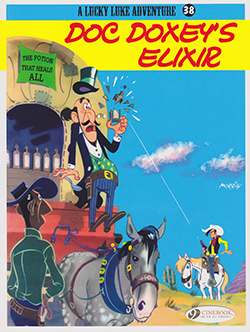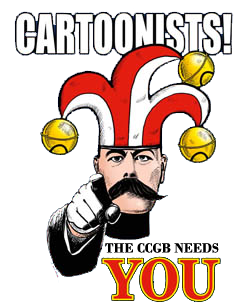 By Morris
By Morris
Publisher: Cinebook
ISBN: 9781849181419
For this volume Cinebook is taking us way back to the early days of Lucky Luke, back to a time before Goscinny came on board as the writer and when all the creative chores were down to Morris alone. It's obvious that this is a strip still attempting to find its voice, but many of the elements that make Lucky Luke work are in place, but just not necessarily shaped and moulded into what we're familiar with. Luke himself has a long-way to go visually to become the character we know, but it's not something that jars at all – you just have to remind yourself it's still early days.
The story (actually two, with one continuing on after the other) concerns a charlatan called Doc Doxey who goes from town to town flogging useless, and sometimes dangerous, potions and elixirs under the guise of cure-all medicines and tonics. Assisted by Scraggy, his underhand and morally-devoid helper, they fleece each town by having Scraggy pose as an elderly or infirm customer who, after taking a swig of the medicine, comes alive with vigour and vim. Naturally, it's never long before the townsfolk realise they've been conned so the Doc is quick to jump in his wagon and move on to the next settlement.
Luke's involvement begins when the Doc's wagon becomes too much for his one horse to pull up a hill. Luke stops to assist but ends up losing Jolly Jumper as they scarper with Luke's horse. Desperate to retrieve him, Luke heads for the nearest town to discover the Doc's recent victims and lay his hands on a temporary horse (a nag called Zigzag whose fond of a tipple). Even though Zigzag is a troublesome ride, now that Luke's in pursuit you know the Doc and Scraggy are going to pay.
In the first tale the Doc is played as a complicated individual, presenting a conflicting persona between offering a public service with his potions and making a fast buck. He clearly is a villain of sorts, but you feel he could be persuaded of the error of his ways. However by the second story he's a much more despicable rogue, and any thoughts of public service are well and truly forgotten.
Even before Goscinny's wit and tight scripting, Morris was still more than capable of turning in a good story with humour and adventure. What Goscinny brought was a full realisation of the strip's potential, but just how much of the groundwork was already done is clear to see within these pages. There aren't many of these early Morris stories, but if they're all as solid as this one then they're certainly worthy of your attention.
And if you like that: Well, you're spoilt for choice for other Lucky Luke books…



No comments yet.